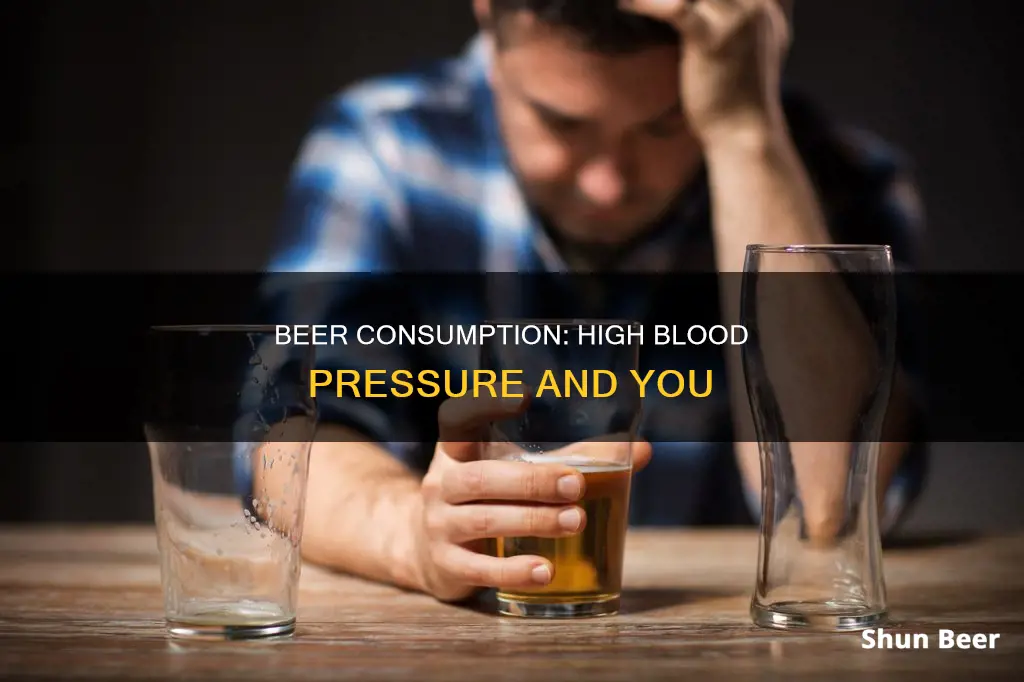
Alcohol is consumed by over 2 billion people worldwide, and it is a common substance of abuse that can lead to more than 200 disorders, including high blood pressure. Drinking alcohol in moderation has been shown to have a subtle drop in blood pressure in some cases. However, drinking excessively can cause high blood pressure, also known as hypertension, and increase the risk of strokes, cardiomyopathy, and arrhythmias. The more alcohol you drink, the higher the risk of developing hypertension. If you drink regularly, you are at risk, especially if you're over the age of 35. One drink a day can increase the risk. Therefore, it is important to limit alcohol consumption to no more than two drinks per day for men and one drink per day for women.
| Characteristics | Values |
|---|---|
| --- | --- |
| Amount of alcohol | A low dose of alcohol (14 grams of pure alcohol/ethanol or less) |
| A medium dose of alcohol (14 to 30 grams of alcohol for men and 14 to 20 grams of alcohol for women) | |
| A high dose of alcohol (more than 30 grams of alcohol for men and more than 20 grams of alcohol for women) | |
| Effect on blood pressure | Low doses of alcohol have no effect on blood pressure within six hours. |
| Medium doses of alcohol decrease systolic blood pressure by 5.6 mmHg and diastolic blood pressure by 4 mmHg within the first six hours of consumption. | |
| High doses of alcohol decrease systolic blood pressure by 3.49 mmHg within the first six hours and by 3.77 mmHg between 7 and 12 hours after consumption. |
What You'll Learn

How much is too much?
Drinking alcohol in moderation is often considered to be acceptable, and even beneficial, for your health. However, when it comes to high blood pressure, how much alcohol is too much?
Alcohol's Impact on Blood Pressure
Alcohol can have both acute and chronic effects on blood pressure. Drinking excessive alcohol is considered one of the most common causes of raised blood pressure. Even a single dose of alcohol can lead to a significant increase in blood pressure within 24 hours of consumption. The effects of alcohol on blood pressure vary depending on the amount consumed, the time since consumption, and individual factors such as age, sex, ethnicity, and health status.
Recommended Limits
The American Heart Association recommends limiting alcohol intake to no more than two drinks per day for men and one drink per day for women. These limits are based on the assumption that one drink is equivalent to:
- 12 ounces of beer (5% alcohol)
- 8 ounces of malt liquor (7% alcohol)
- 5 ounces of wine (12% alcohol)
- 1.5 ounces of 80-proof liquor
Exceeding these limits can increase the risk of high blood pressure and other cardiovascular issues. It's important to note that these limits may need to be adjusted based on individual factors.
Factors Affecting Alcohol's Impact on Blood Pressure
The impact of alcohol on blood pressure can be influenced by various factors:
- Age: Older adults may be more sensitive to the effects of alcohol on blood pressure due to changes in body composition, liver function, and medication use.
- Sex: Women may be more susceptible to the effects of alcohol due to lower body weight and higher body fat percentage, leading to faster absorption and slower elimination of alcohol.
- Ethnicity: Genetic variations in alcohol metabolism enzymes can affect how alcohol is processed in the body, leading to differences in blood pressure responses across ethnicities.
- Health Status: Individuals with existing health conditions, such as hypertension, heart disease, or liver problems, may experience more significant effects on blood pressure when consuming alcohol.
Binge Drinking and High Blood Pressure
Binge drinking, defined as consuming more than two drinks in a day for men or one drink for women, can lead to a rapid rise in blood pressure. This can be particularly dangerous for individuals with very high blood pressure levels, as it may increase the risk of stroke.
Alcohol's Impact on Heart Health
While moderate alcohol consumption may provide some heart health benefits, excessive alcohol intake can have detrimental effects. Heavy and regular alcohol use can increase the risk of high blood pressure, cardiomyopathy, arrhythmias, and stroke. Additionally, alcohol can interfere with heart function by affecting the renin-angiotensin-aldosterone system, stimulating the sympathetic nervous system, and diminishing baroreceptor sensitivity.
Individual Variation
It's important to remember that the impact of alcohol on blood pressure can vary from person to person. Some individuals may be more sensitive to the blood pressure-raising effects of alcohol, while others may experience a subtle drop in blood pressure with light to moderate drinking.
When it comes to high blood pressure, it's crucial to monitor your alcohol intake and stay within recommended limits. Excessive alcohol consumption can have detrimental effects on blood pressure and heart health. If you have high blood pressure, it's important to discuss your alcohol consumption with your healthcare provider to determine a safe level of intake for you.
Beer and NFL: What's the Official Verdict?
You may want to see also

Alcohol's effect on blood pressure
Alcohol can have both acute and chronic effects on blood pressure. The American Heart Association recommends no more than two drinks per day for men and one drink per day for women. However, this limit may vary depending on your health and other factors.
Drinking alcohol can raise your blood pressure, and if you have high blood pressure, your healthcare provider may ask you to cut back on drinking. Excessive alcohol consumption is considered one of the most common causes of high blood pressure.
The effects of alcohol on blood pressure depend on the time after consumption and the amount of alcohol consumed. Alcohol decreases blood pressure initially (up to 12 hours after ingestion) and increases blood pressure afterward.
Low-dose alcohol consumption (less than 14 grams) within six hours does not affect blood pressure but increases heart rate.
Medium-dose alcohol consumption (14 to 28 grams) within six hours decreases systolic and diastolic blood pressure and increases heart rate.
High-dose alcohol consumption (>30 grams) within six hours decreases systolic and diastolic blood pressure and increases heart rate. This effect lasts up to 12 hours, after which blood pressure increases.
The effects of alcohol on blood pressure may vary based on age, sex, ethnicity, family history, and liver condition. Women may be more affected by alcohol than men due to their lower body weight and higher body fat percentage.
Several long-term observational studies suggest that light to moderate alcohol consumption is associated with a reduced risk of adverse cardiovascular events. However, regular consumption of high doses of alcohol could lead to sustained high blood pressure and related adverse consequences.
The Art of Distilling: Brewing Beer, Simplified
You may want to see also

High blood pressure: the facts
High blood pressure, or hypertension, is a common condition that affects millions of people worldwide. While it often has no symptoms, it can lead to serious health issues if left untreated. Here are some key facts about high blood pressure and how it relates to alcohol consumption.
Alcohol and High Blood Pressure
Drinking alcohol can have both acute and chronic effects on blood pressure. While light to moderate drinking (up to two drinks per day for men and one drink per day for women) may not significantly impact blood pressure, heavy and regular alcohol consumption can lead to a rise in blood pressure. Binge drinking, defined as consuming five or more drinks for men or four or more drinks for women in a span of two hours, can cause a temporary spike in blood pressure.
Mechanisms
The impact of alcohol on blood pressure is influenced by its effects on various body systems and hormones:
- The brain and nervous system release fight-or-flight hormones like adrenaline, which raises blood pressure and heart rate.
- Alcohol increases calcium levels, causing blood vessels to narrow and blood pressure to rise.
- Alcohol consumption leads to an increase in antidiuretic hormone (ADH), which causes the body to retain more water, resulting in higher blood pressure.
- Renin-angiotensin-aldosterone levels rise, causing blood vessels to narrow and blood pressure to increase.
- Cortisol, a stress hormone, is elevated, leading to water retention and elevated blood pressure.
- Baroreceptors, sensors in blood vessels, respond to regular alcohol use by increasing blood pressure.
Alcohol and Heart Health
While some studies suggest that a glass of red wine a day may offer heart health benefits, these findings are often influenced by other factors such as a healthy diet and lifestyle. The polyphenols in red wine can improve blood vessel health and blood flow but may not directly lower blood pressure. The overall impact of alcohol on heart health depends on an individual's entire health profile, including age, gender, and other risk factors.
Managing High Blood Pressure
For individuals with high blood pressure, limiting or quitting alcohol is one of the most effective ways to lower blood pressure. Reducing alcohol intake can lead to a significant improvement in blood pressure readings. Additionally, maintaining a healthy weight through diet and exercise, cutting back on sodium, and reducing stress are essential strategies for managing high blood pressure.
George Jones' Relationship with Beer Explored
You may want to see also

Drinking alcohol with high blood pressure medication
Drinking alcohol while on high blood pressure medication is not recommended. Alcohol can interfere with how your medication works, making it less effective or even toxic. It can also intensify side effects, such as nausea, vomiting, headaches, and drowsiness.
The more you drink, the greater the risks become. Alcohol may affect each person differently, but drinking while taking high blood pressure medication can lead to serious side effects such as severe drowsiness, dizziness, fainting, and heart rhythm problems.
If you are taking high blood pressure medication, it is important to ask your doctor or pharmacist if it is safe to drink alcohol. They may recommend limiting or avoiding alcohol altogether to prevent dangerous interactions.
Drinking 12 Beers Daily: Is It Deadly?
You may want to see also

Alcohol's effect on heart health
Alcohol's Effect on Blood Pressure
Drinking too much alcohol can raise blood pressure and lead to hypertension. Binge drinking, defined as consuming more than five standard drinks in a single sitting for men and four for women, is associated with a transient increase in blood pressure.
Alcohol's Effect on the Cardiovascular System
Low-to-moderate alcohol consumption may have a protective effect on the cardiovascular system, reducing the risk of cardiovascular disease and mortality. However, this benefit is open to debate, and any positive effects must be weighed against the serious physiological consequences of excessive drinking.
Excessive alcohol intake can contribute to cardiomyopathy, a disorder affecting the heart muscle, and increase the risk of heart failure, stroke, and high blood pressure. It can also lead to obesity and associated health problems.
Drinking Patterns and Types of Alcoholic Beverages
Drinking patterns, particularly binge drinking, are associated with an increased risk of cardiovascular conditions. The type of beverage consumed may also play a role, with some studies suggesting that wine may offer more protection due to its polyphenol content. However, these findings are inconclusive, and other factors such as drinking with meals may influence the results.
Acute and Long-Term Effects of Alcohol on the Myocardium
Acute alcohol consumption can have a negative inotropic effect, weakening the heart's ability to contract. It can also lead to arrhythmias and, in rare cases, sudden cardiac death.
Long-term heavy alcohol consumption can result in alcoholic cardiomyopathy, characterised by a dilated left ventricle, increased left ventricular mass, and reduced ejection fraction. This condition can lead to significant changes in cardiac function and poor quality of life.
Recommendations for Future Research
More research is needed to understand the effects of alcohol consumption on older adults, as this population is expected to grow, and they may consume alcohol at higher rates than previous generations. Additionally, the impact of drinking patterns and beverage types on cardiovascular health requires further investigation.
Quitting Beer: Blood Pressure Friend or Foe?
You may want to see also
Frequently asked questions
Drinking beer or any alcoholic beverage is not recommended for people with high blood pressure. Alcohol can cause high blood pressure and increase the risk of strokes, cardiomyopathy, and arrhythmias.
There is no safe amount of beer or any alcoholic beverage for people with high blood pressure. Even one drink a day can increase the risk of hypertension.
It is not advisable to mix alcohol with high blood pressure medication as it can cause a rapid increase in blood pressure, which can lead to a stroke.
Some alternatives to drinking beer or other alcoholic beverages if you have high blood pressure include losing weight through diet and exercise, reducing sodium intake, and managing stress.







